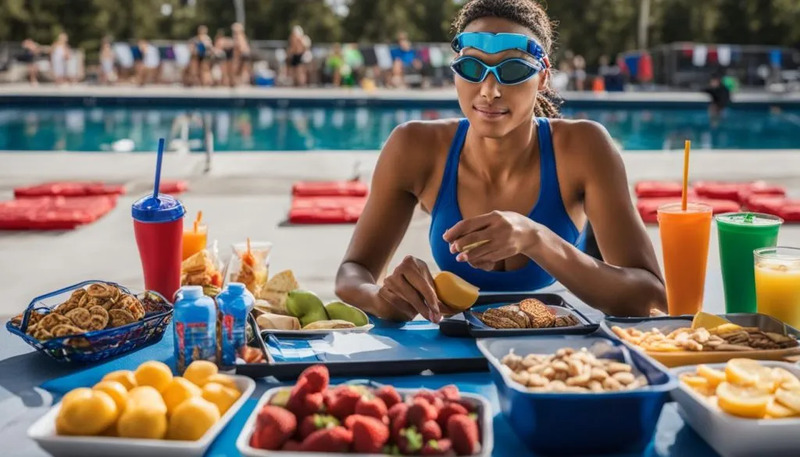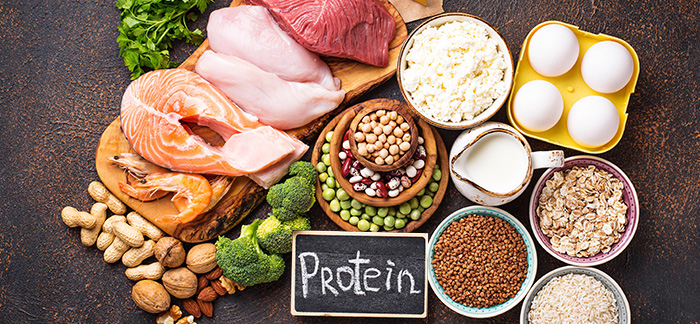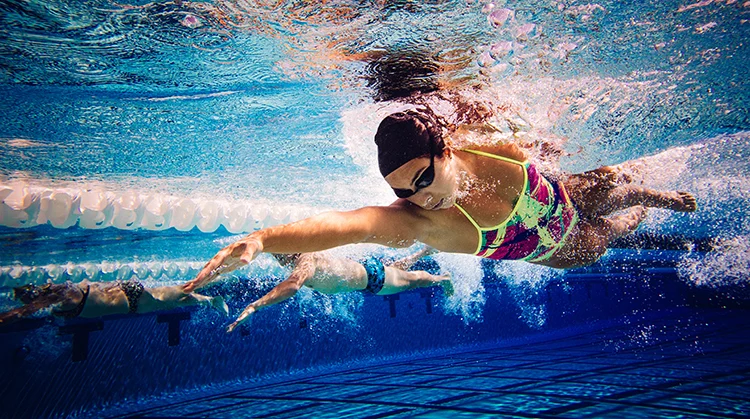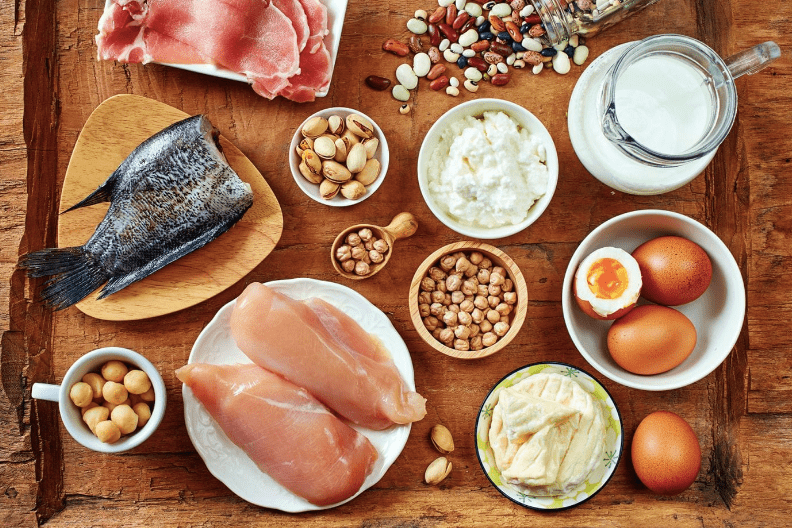Swimming, a demanding sport that combines endurance, strength, and technique, requires a specialized diet to optimize performance and recovery. This comprehensive guide explores the best dietary practices for swimmers, highlighting the importance of nutrients, meal timing, and hydration.
Key Takeaways
- Understand the crucial role of carbohydrates, proteins, and fats in a swimmer’s diet for energy and recovery.
- Hydration is key; learn to manage water intake and electrolytes to enhance performance.
- Meal timing can significantly impact a swimmer’s performance; learn the best times to eat around training and competitions.
- Supplements and performance enhancers can be beneficial, but must be used wisely and under guidance.
- Personalize your diet plan by working with a nutritionist to tailor your nutritional intake according to your training and competition needs.
Fueling for the Pool: What to Eat Before and After Swimming
Pre-swim energizers
Before diving into the pool, it’s crucial to fuel up with the right nutrients to optimize performance. Aim for a meal rich in carbohydrates about 3-4 hours before swimming to ensure a steady energy supply. Good options include whole grains, fruits, and legumes. Hydration is also key, so drink plenty of fluids leading up to your swim.

Post-swim recovery meals
After you’ve finished your laps, your body needs to recover. A mix of carbohydrates and proteins within 30 minutes post-swim can help replenish glycogen stores and repair muscle tissues. Consider a smoothie with banana, protein powder, and a handful of spinach or a simple turkey sandwich on whole-grain bread.
Hydration essentials
Staying hydrated is non-negotiable for swimmers. During your swim sessions, sip on water or a sports drink that includes a mix of glucose and fructose to maintain energy levels. Post-swim, continue to hydrate to aid in recovery and prepare for your next session.
Carbs, Proteins, and Fats: Building Blocks of a Swimmer’s Diet
Why carbs are a swimmer’s best friend
Carbohydrates are the primary fuel source for swimmers, providing the energy needed to power through both training and competitions. Complex carbohydrates like whole grains and fruits should be a staple in a swimmer’s diet to ensure a steady release of energy.
The power of protein
Protein is crucial for muscle repair and growth. After intense swim sessions, consuming protein helps reduce muscle breakdown and speeds recovery. Good sources include lean meats, fish, and plant-based proteins like beans and lentils.

Balancing fats for optimal energy
While fats might be slower to convert into energy, they are essential for long-term fuel, especially during extended training sessions. Healthy fats such as avocados, nuts, and seeds should be included in a swimmer’s diet to support overall health and energy levels.
Remember: A balanced diet with the right mix of carbohydrates, proteins, and fats is essential for peak performance and recovery.
Hydration Strategies for Swimmers
Understanding your water needs
Hydration is critical for swimmers to maintain performance and prevent dehydration. Before a swim, aim to take in about 5-7 ml of water per kg of body weight starting four hours prior. This intake should increase if the session is intense or prolonged. Remember, staying hydrated isn’t just about drinking water; it’s about understanding your body’s needs and adjusting accordingly.
Electrolytes and performance
Electrolytes are your best friends when it comes to maintaining your energy levels during long swims. Sports drinks can be beneficial as they contain electrolytes that replace the minerals lost during intense sessions. Aim for a drink that provides a good balance of sodium, potassium, and magnesium.
Tips for staying hydrated
To ensure you’re well-hydrated, follow these simple tips:
- Drink fluids consistently before, during, and after training.
- Opt for water or sports drinks with electrolytes for longer sessions.
- Monitor your hydration status by checking the color of your urine—it should be light yellow.
Pro Tip: Always have a cold drink handy to help regulate your body temperature more effectively during and after your swims.
Meal Timing and Frequency
Best times to eat around training
Timing your meals around training sessions is crucial for maintaining energy levels and optimizing performance. Swimmers should aim to eat a balanced meal 2-3 hours before training to allow for digestion and to fuel the body adequately. Post-training, it’s important to consume a meal or snack within 30 minutes to help replenish glycogen stores and facilitate muscle recovery.
How often should swimmers eat?
Swimmers need to eat more frequently than the average person due to their high energy expenditures. Eating every 3-4 hours can help maintain blood sugar levels and provide a constant supply of energy. This includes three main meals and 2-3 snacks throughout the day, depending on the intensity and duration of the training sessions.
Pre-competition eating strategies
Before a competition, the focus should be on carbohydrates to top off glycogen stores. A light meal or snack that is easy to digest and familiar to the stomach should be consumed 1-2 hours before the event. This helps avoid any gastrointestinal discomfort during the competition and ensures that energy levels are sustained throughout.
Read more: The Ultimate Swimmer’s Diet: What to Eat for Optimal Performance
Supplements and Performance Enhancers
Navigating the World of Supplements
Diving into the world of supplements can feel like exploring a treasure trove of performance boosters. From creatine to caffeine, each supplement offers unique benefits tailored to support your swimming regimen. It’s crucial to choose wisely to avoid the pitfalls of unnecessary or harmful additives.

Essential Vitamins and Minerals
Swimmers need a robust array of vitamins and minerals to maintain peak performance. Key players include Vitamin D for bone health and iron for oxygen transport. Ensuring a balanced intake through diet or supplements can significantly enhance your training outcomes.
When to Consider Performance Enhancers
While natural nutrition should always be your first go-to, there are times when performance enhancers can be beneficial. For instance, during intense training cycles or leading up to a big competition, certain supplements can provide that extra edge. However, always consult with a healthcare professional before starting any new supplement regimen.
Remember, the goal is to complement your diet, not replace it. Supplements should be used judiciously to fill nutritional gaps and boost performance where needed.
Smart Snacking for Sustained Energy
Healthy snack ideas
Snacking smart isn’t just about choosing the right foods; it’s about fueling your body consistently throughout the day. Opt for snacks that combine carbohydrates with proteins to sustain energy levels. Some top picks include yogurt with berries, apple slices with peanut butter, and whole-grain crackers with cheese.
Snacks to avoid
It’s crucial to steer clear of snacks that can spike your blood sugar and lead to a crash. Highly processed foods, sugary treats, and high-fat fast foods should be avoided. Instead, focus on whole, nutrient-dense foods that provide lasting energy.
Timing your snacks for maximum benefit
To get the most out of your snacking, time them strategically around your training. Eating a balanced snack about an hour before swimming can give you the continuous fuel you need without weighing you down. Post-training, a carbohydrate-rich snack can help replenish energy stores and speed up recovery.
Personalizing Your Diet Plan
Working with a nutritionist
Finding the right nutritionist can be a game-changer for swimmers looking to optimize their performance. A professional can tailor a diet plan that considers your training intensity, body composition goals, and competition schedule. This personalized approach ensures your nutritional needs are met, supporting not just performance but also recovery and overall health.

Adjusting your diet for training cycles
Your dietary needs can change dramatically depending on where you are in your training cycle. During heavy training periods, you might need more carbohydrates and proteins to fuel recovery. Conversely, during lighter training days or off-season, your focus might shift towards maintaining a balanced diet with a reduced caloric intake. It’s all about finding what works best for you at each stage of your training.
Listening to your body
It’s crucial to stay attuned to your body’s signals. If you’re feeling sluggish or not recovering well, it might be time to reassess your diet. Experimenting with different foods and observing how your body responds can help you fine-tune your diet for optimal energy and performance. Remember, what works for one swimmer might not work for another, so it’s important to find your own balance and stick to it.
Embark on a journey to optimize your health with a personalized diet plan tailored just for you! At Swim Time Log, we understand the unique nutritional needs of swimmers and athletes. Dive into our comprehensive guides and create a diet plan that boosts your performance in the water. Visit our website to get started and swim your way to better health!
Wrapping It Up
Alright, swimmers and swim enthusiasts! We’ve dived deep into the world of nutrition tailored just for you. Remember, balancing carbs, proteins, and fats, along with staying hydrated, isn’t just a suggestion—it’s your secret weapon! Whether you’re training for the big leagues or just love doing laps at the local pool, getting your diet right can really boost your performance. Don’t shy away from consulting a sports nutritionist to fine-tune your eating plan. Here’s to making every stroke count and powering through the water like a champ!
Read more: Fueling Performance: The Good Diet Guide for Swimmers
AUTHOR
Sang Nguyen
Sang Nguyen is a former national swimmer for Vietnam who has transitioned into coaching. With a passion for fostering a healthy swimming community and connecting like-minded individuals,......Read More
BLOG
Maybe You Are Interested
Good Swim Meet Snacks: What to Eat for Optimal Performance
Good nutrition is crucial for swimmers to maintain energy, recover quickly, and perform at their...
Read More...Optimizing Your Performance: The Best Diet for Swimming Training
Optimizing your performance in swimming is not just about rigorous training; it’s equally crucial to...
Read More...Achieve Peak Performance with This Diet Chart for Swimmers
Whether you’re a novice or an expert swimmer, understanding the right diet is crucial for...
Read More...Eating Like a Champion: Exploring the Diet of Michael Phelps
Michael Phelps, renowned for his Olympic triumphs, has a diet as extraordinary as his swimming...
Read More...Muscle Gain for Swimmers: Tailoring Your Diet for Strength
Swimming is a demanding sport that requires a tailored approach to nutrition to support muscle...
Read More...A Comprehensive Diet Plan To Gain Weight For Swimmers
Swimming is a demanding sport that requires meticulous attention to nutritional needs to optimize performance,...
Read More...